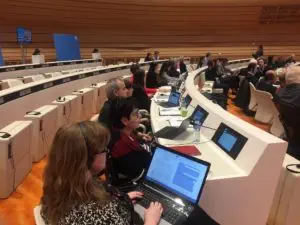The past week was historic for the rights movement in Canada. The very first review of the country under the Convention on the Rights of Persons with Disabilities (CRPD) was held at the United Nations.
It will come as no surprise to anyone familiar with both poverty and disability that Canada had a lot to account for: persons with disability are significantly over-represented among the 235,000 persons experiencing homelessness each year and are twice as likely to live below the poverty line.
“These statistics illustrate systemic policy discrimination,” said Laura Cattari, Vice-President of Canada Without Poverty. “I cannot help but see that services and income security programs are inadequately coordinated and provisioned to assist persons with disability like myself.”
Disability barriers are caused by or worsened by poverty – and in turn, poverty can result from an acquired disability. As a society looking for solutions and seeking to end poverty, we cannot separate these two realities; we need to move away from systems and solutions that treat poverty as a separate issue than disability, and vice-versa.
But it is vital that our approach is not a token gesture. It is simply not good enough to slap a label on a new program or give a new policy a catchy name and hope that such an action will be a solution.
It must be mainstream knowledge that laws, policies, and programs – including our forthcoming national housing and poverty reduction strategies – require an approach that recognizes the genuine experiences of persons with disabilities. It is not enough to merely acknowledge the connection – we need a rights-based framework.
Despite urging from various United Nations treaty body committees, governments in Canada refuse to recognize social and economic rights as full human rights that can be legally claimed. At this review, the UN Committee put the spotlight directly on Canada’s lack of direction in ensuring that these rights are accessible – especially for those individuals experiencing both poverty and disability.
 For these individuals, it is unclear exactly what means and mechanisms can be used to hold the government to account. Canadian courts and government lawyers continue to argue against the ability for people in poverty, like the members of CWP’s Board of Directors, to claim economic and social rights. Without access to remedies for violations of these rights, persons with disabilities are left with nowhere to turn when they are denied rights such as access to adequate housing or social security benefits.
For these individuals, it is unclear exactly what means and mechanisms can be used to hold the government to account. Canadian courts and government lawyers continue to argue against the ability for people in poverty, like the members of CWP’s Board of Directors, to claim economic and social rights. Without access to remedies for violations of these rights, persons with disabilities are left with nowhere to turn when they are denied rights such as access to adequate housing or social security benefits.
Canada Without Poverty believes firmly in international human rights as a mechanism for change, but in order to embrace rights, we need to follow up with genuine implementation and accountability. We cannot simply expect to meet in Geneva every five years to discuss the rights of persons with disabilities and pat ourselves on the back for a job well-done. Human rights are not aspirations set by an international body – these are concrete legal obligations and the Canadian government must meet them.
In a couple of weeks, the Committee will release its final recommendations – called concluding observations – detailing what actions Canada should take to move forward on these rights. Now, our governments must have the political will to ensure that we make progress for some of those most historically marginalized individuals in Canada. Without genuine action, we’ll be back in Geneva in five years having the very same conversation.
To watch CWP’s video coverage of the review, click here.
Laura Cattari is the Vice-President of Canada Without Poverty.
Michèle Biss is the Legal Education and Outreach Coordinator at Canada Without Poverty.

